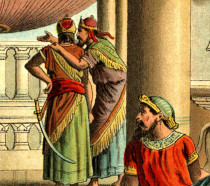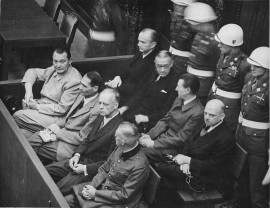
Purim
Summary
Purim remembers the defeat of a plot to exterminate the Jewish people by the evil Haman. It is remembered by the public reading of the book of Esther while "blotting out" the villain's name (usually by making lots of noise).
It lasts for one day and involves costume parties; drinking; eating fruit-filled triangular cookies and giving baskets of fruit, pastries and other sweet things as gifts to friends and neighbours.
Check out our Hamentaschen (Haman's ears) recipe here, and Purim dates here.
In the Bible
The story of Purim is told in the book of Esther. It is an unusual book, because it is the
only book of the Bible that does not contain the name of God. In fact, it includes virtually no reference to God at all.
Mordechai makes a vague reference to the fact that the Jewish people will be saved by someone else, if not by Esther, but that is the closest the book comes to mentioning God.
Thus, one important message that can be gained from the story is that God often works in ways that are not apparent, in ways that appear to be chance, coincidence or ordinary good luck.
In the twelfth month, which is the month of Adar, on its thirteenth day... on the day
that the enemies of the Jews were expected to prevail over them, it was turned about: the Jews prevailed over their adversaries. - Esther 9:1
And they gained relief on the fourteenth, making it a day of feasting and gladness. - Esther 9:17
[Mordechai instructed them] to observe them as days of feasting and gladness, and sending delicacies to one another, and gifts to the poor. - Esther 9:22
In more detail
The heroes of the story are Esther, a beautiful young Jewish woman living in Persia, and her cousin Mordechai , who raised her as if she were his daughter. Esther was taken to the house of Ahasuerus, King of Persia, to become part of his harem.
King Ahasuerus loved Esther more than his other women and made Esther queen, but the king did not know that Esther was Jewish, because Mordechai told her not to reveal her identity. The villain of
the story is Haman, an arrogant, egotistical advisor to the king, who hated Mordechai because Mordechai refused to bow down to him. So Haman plotted to destroy the Jewish people:
"There is a certain people scattered abroad and dispersed among the peoples in all the provinces of your realm. Their laws are different from those of every other people's, and they do not observe the king's laws; therefore it is not befitting the king to tolerate them." Esther 3:8.
The king gave the fate of the Jewish people to Haman, to do as he pleased to them... and so Haman planned to exterminate all of the Jews. As a result, Mordechai persuaded Esther to speak to the king on behalf of the Jewish people. This was a dangerous thing for Esther to do, because anyone who came into the king's presence without being summoned could be put to death, and she had not been summoned. Esther fasted for three days to prepare herself, then went into the king.
He welcomed her and later she told him of Haman's plot against her people. The Jewish people were saved, and Haman and his ten sons were hanged on the gallows that had been prepared for Mordechai.
Evil repeated in history
The Passover service reminds us that in every generation, there are those who rise up to destroy us, but God saves us from their hand. In the time of the Book of Esther, Haman was the one who tried to destroy us. In modern times, there have been two significant figures who have threatened the Jewish people, and there are echoes of Purim in their stories.
Many have noted the echoes of Purim in the Nuremberg war crime trials. In the Book of Esther, Haman's ten sons were hanged (Esther 9:13); in 1946, ten of Hitler's top associates were put to death by hanging for their war crimes (including the crime of murdering 6 million Jews). An 11th associate of Hitler, Hermann Göring, committed suicide the night before the execution, a parallel to the suicide of Haman's daughter recorded in the Talmud (Megillah 16a).
There are also rumors that Göring was a transvestite, making that an even more accurate parallel. One of the men seems to have been aware of the parallel: on the way to the gallows, Julius Streicher shouted "Purim Fest 1946!"



